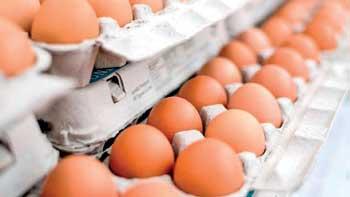Reply To:
Name - Reply Comment
The poultry industry is yet again faced with a shortage of chicken feed, which has affected the availability of eggs in the local market. However, sector players assure that efforts are being taken to ensure prices do not escalate.
As food and utility prices continue to soar to unaffordable levels, the All Island Poultry Association (AIPA) said that measures are being taken to increase production and ensure eggs are available for consumption at reasonable rates.
 Speaking to Mirror Business, AIPA President Ajith Gunasekera said that at present egg production has contracted by about 40 percent due to a shortage of chicken feed and high humidity levels.
Speaking to Mirror Business, AIPA President Ajith Gunasekera said that at present egg production has contracted by about 40 percent due to a shortage of chicken feed and high humidity levels.
The majority of the small-scale farms have closed down failing to make their own feed due to the poor availability of vital ingredients in the country.
Poultry feed manufacturers are unable to cater to the additional demand created by small-scale farmers owing to the limited production capacity.
“The drop in egg production is due to the weather and poor quality of feed available. Small scale egg productions have stopped to a great extent as they are unable to make profits because of high cost of production. So most of the birds have been sold off for meat,” said Gunasekera.
The quality of chicken feed has dropped significantly due to the limited availability of maize, which is the principal energy source used in poultry diets. The chicken feed formula constitutes of at least 50 percent of maize.Access to the crop was already a challenge for those in the industry due to the ‘maize mafia’, but the unpopular fertilizer ban severely hampered production in Sri Lanka. The policy decision brought the total output for the year to a mere 75,000 MT from the expected 300,000 MT. Government nod was given in November 2021 to import 175,000 MT of maize, but the industry was able to import only 45,000 MT as a result of the ongoing forex crisis. However, the industry will be importing the balance 130,000 MT from India via the recently secured credit line. The approval for the same was given this week.
“Once we get the stock of maize from India, we are confident the egg production will increase which in turn will help keep prices at affordable levels,” said Gunasekera.
At present, the price of an egg generally ranges between Rs. 30 – Rs. 33 in the market. However, due to logistics issues in bringing the stock to the distribution centres due to the fuel shortages, many middlemen have intervened to procure the stock and sell an egg for as high as Rs. 38 – Rs. 40. Gunasekera shared that the industry stakeholders have met with the relevant government officials so that the issues connected with access to raw materials and logistics are ironed out so that eggs remain affordable to consumers.(SAA)